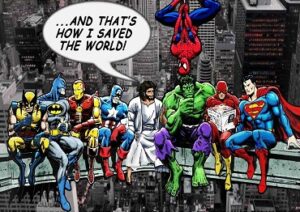This is Faith in Play #58: Supers, for September 2022.
Last month I added Heroes to the list of archetypes from which we can learn something, and in conclusion I distinguished those ordinary people who rise to the need from the more potent archetype which I called the superhero. I said maybe we would come back to that, and as I put the finishing touches on that article and wondered what to do for this month, it struck me that I could do that topic next. Not that I had any notion of what we can learn from superheroes, but that’s never stopped me before.

And the first thing I actually realized is that there is a very thin line between super heroes and super villains.
The realm of superheroes is populated by a myriad of comic book and movie characters–Superman, Spiderman, Captain America–but it also includes extraordinary individuals, such as Conan the Barbarian or Batman or Green Arrow, people whose powers come partly from natural talent and partly from exercise or practice, but don’t include any inhuman abilities. But that world also includes persons with powers who use them for their own selfish interests.
And the difference probably falls in one statement we probably all have heard, that which separates the heroes from the villains, attributed to Peter Parker’s Uncle Ben: With great power comes great responsibility. Those supers who believe that become heroes; those who don’t become villains.
My friend Eric Ashley created a world, adapted for Multiverser play somewhere, in which supers were common in one particular city. Some were heroes, some were villains, but he also listed some as mercenaries. These, he said, were neither good nor evil, but were in it for the money. Yet I wonder whether that’s a valid distinction. Lex Luthor will certainly help build a hospital if there’s something in it for him. Mercenary supers, in this sense, are just villains willing to work with the good guys when it is to their advantage, and that might well describe all supervillains. What makes the super a hero is that dedication to valuing the lives of others and working for their benefit; what makes one a villain is simply not having that, using powers for personal gain.
So the lesson of the superhero and the supervillain is ultimately the same as the lesson of life: heroes live their lives to help others, and failure to do that is to be a villain.

Northgate City. The most prominent of the mercs is a power armor clad super called Forcemerchant. But to make things more complicated, there is Dr. Zhorbhakian, the World’s Smartest Man (trademarked) who along with his vast powers has a belief that he is a hero, even if he takes the Law as a dimwitted suggestion, and is willing to do things like secretly transfer everyone’s brains into robots in an alternate bubble universe that hecontrols so as to save the world from the inevitable failure of the superheroes which will cause the world to explode. Then there is Soliton, this world’s Superman, who destroyed a planet on purpose for what he thought were good reasons, and now out of guilt basically does nothing. Forcemerchant might well argue that he is better than either as he does not take certain jobs which conflict with his somewhat expansive moral code.
And this is intermixing effect with intent. And intermixing perhaps delusional beliefs, definitely law breaking and human rights shattering beliefs in one’s own need to Do the Right Thing, with being a Hero. If you break the Law to save the World, are you a Hero? Or did you disregard a lesser Law in favor of a Greater Law? What if everyone else says ‘you’re insane’. What if everyone else is legitamately not smart enough to get in a battle of wits with you? What if, you think the best thing for the world if for you to withhold your efforts?
Its clear FM is not a hero. He would not claim to be.
And what about mercs who have less of an expansive moral code, and more of a ‘get paid’ code?
Superheroes offer the chance to ask grand moral questions. In the normal universe, a man saying ‘I am the smartest person on the planet, and you cannot understand why I must do this’ is a delusion, but if Dr. Z says it, it might well be true.